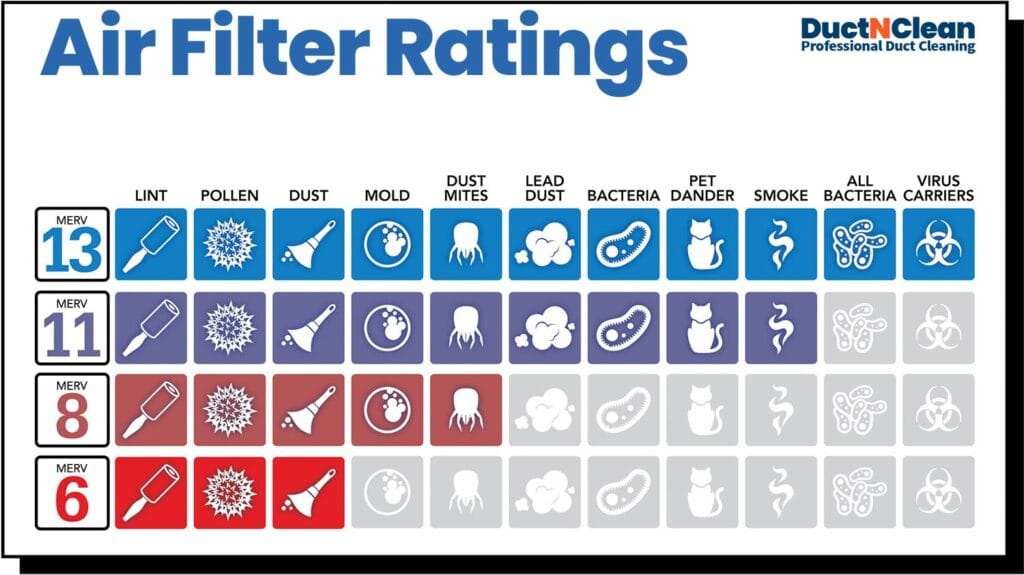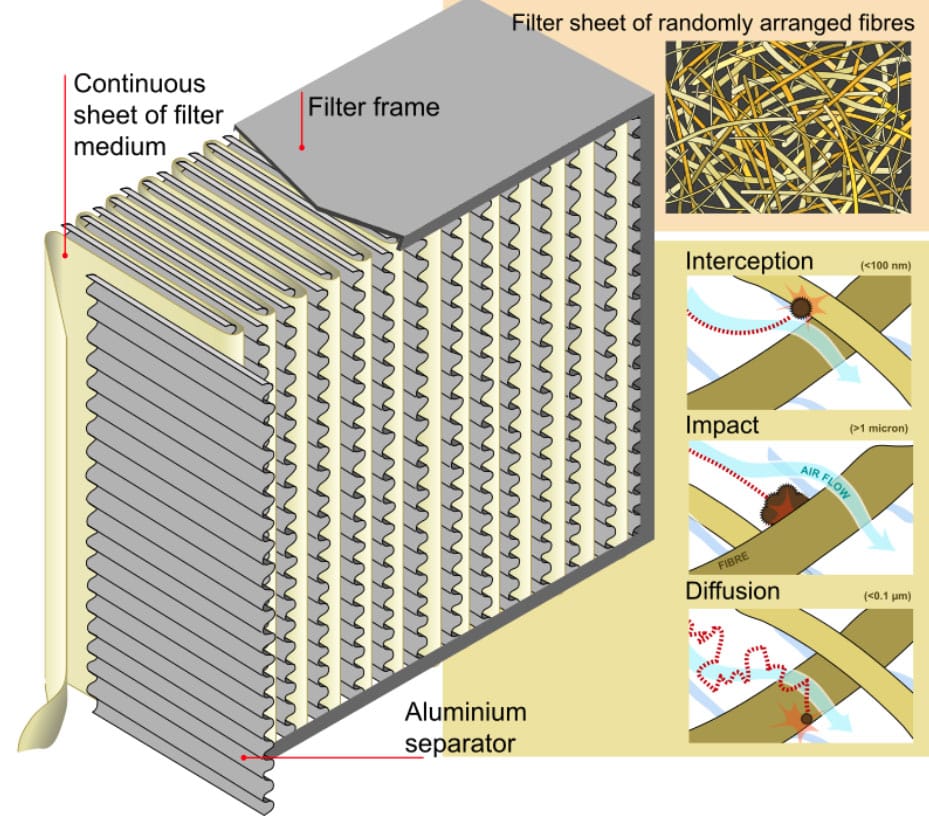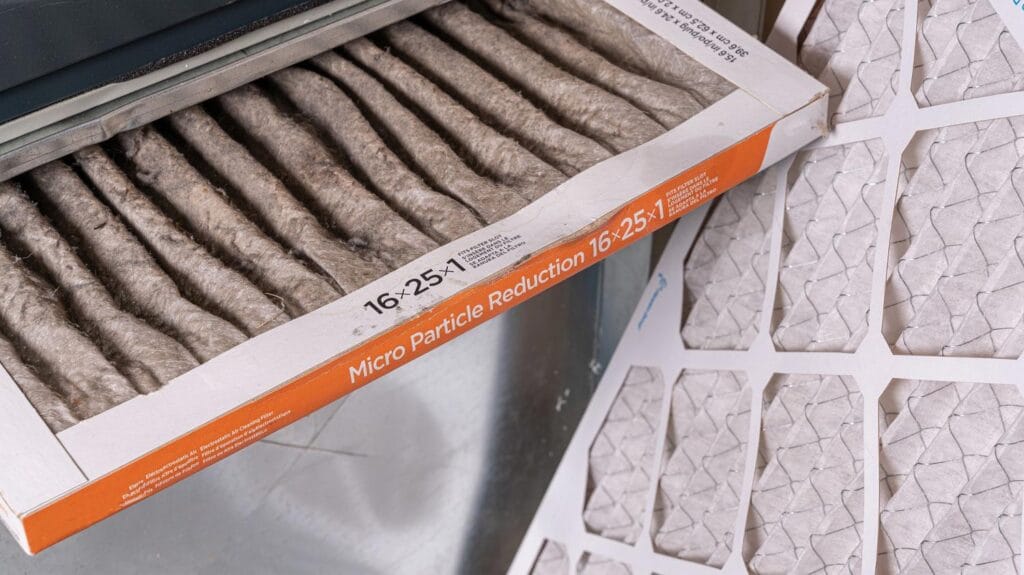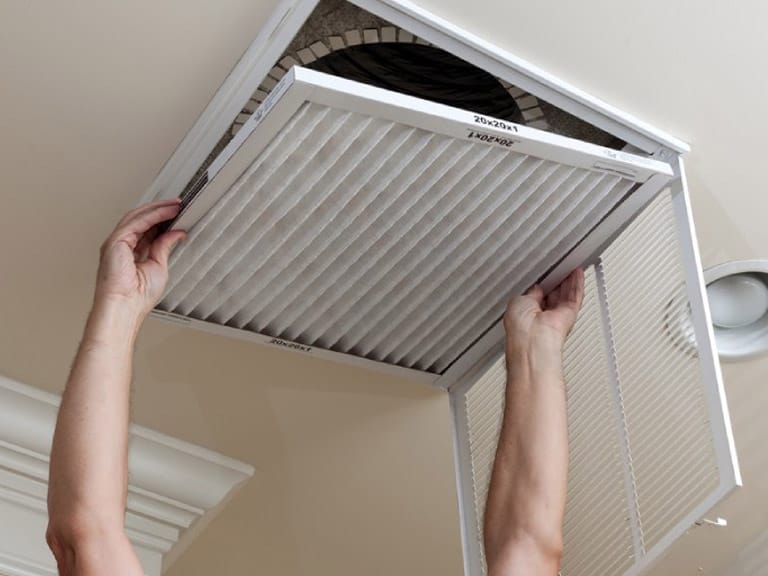In North Carolina’s humid climate, your air filter is more than just a basic HVAC component—it’s your home’s primary defense against allergens, dust, and poor indoor air quality. Whether you’re dealing with Raleigh’s notorious spring pollen or Wake Forest’s seasonal humidity challenges, understanding how to select and maintain your HVAC filter can dramatically improve your family’s comfort and health.
At DuctNClean, we’ve helped thousands of homeowners across Wake County optimize their indoor air quality through proper filtration and professional maintenance. This comprehensive guide covers everything you need to know about choosing the right air filter for your home and recognizing when it’s time for a replacement.
1. What is an HVAC Filter?
An HVAC filter serves as your home’s first line of defense against airborne contaminants. Located in your system’s return air pathway, this essential component captures dust, pollen, pet dander, and other particles before they can circulate through your heating and cooling system.
The Science Behind Air Filtration
Modern air filters work through several mechanisms to clean your indoor air:
Mechanical Filtration: Physical barriers trap particles as air flows through the filter media. This is the most common type found in residential HVAC systems throughout Raleigh and surrounding areas.
Electrostatic Filtration: Static electricity attracts and holds particles to the filter surface. These filters are particularly effective in homes with pets or high dust levels.
Activated Carbon: Specialized filters that absorb gases, odors, and volatile organic compounds (VOCs). These are ideal for homes near busy roads or industrial areas.
Combination Methods: Advanced filters that utilize multiple technologies for comprehensive air cleaning.
For homeowners in Raleigh, Cary, and Wake Forest, understanding these filtration methods helps in selecting the most appropriate HVAC filter for your specific indoor air quality challenges.
Why Filter Quality Matters in North Carolina
North Carolina’s climate presents unique challenges for indoor air quality. High humidity levels, especially during summer months, can promote mold growth and increase the need for proper HVAC mold remediation service. Additionally, our region’s intense pollen seasons—both spring and fall—can quickly overwhelm inadequate filtration systems.
A quality air filter not only improves your breathing environment but also protects your HVAC equipment from premature wear. When particles accumulate on cooling coils and fan motors, your system works harder, leading to increased energy costs and potential breakdowns.
2. How to Choose the Best Air Filter for Your Raleigh Home
Selecting the right HVAC filter depends on several factors including your home’s specific needs, your family’s health considerations, and your HVAC system’s capabilities. Here’s what you need to know to make an informed decision.
Understanding MERV Ratings
The MERV (Minimum Efficiency Reporting Value) rating system provides a standardized way to compare air filter effectiveness. Understanding these ratings helps you choose the best filter for your specific situation.
MERV 1-4: Basic protection that captures large particles like carpet fibers and dust mites. These filters provide minimal air quality improvement but protect your HVAC equipment from large debris.
MERV 5-8: Better protection that traps most common household particles including dust, pollen, and mold spores. This range is suitable for most homes in Raleigh without specific air quality concerns.
MERV 9-12: High-efficiency filtration that catches smaller particles like auto emissions and lead dust. These filters are ideal for families with mild to moderate allergies.
MERV 13-16: Maximum residential protection that filters bacteria, tobacco smoke, and particles as small as 0.3 microns. These high-efficiency filters are recommended for homes with severe allergies or respiratory conditions.

The Sweet Spot for Wake County Homes
For most residential properties in Raleigh , Wake Forest, and Cary, we typically recommend MERV 8-11 filters. This range provides excellent filtration for common allergens without significantly restricting airflow in standard residential HVAC systems.
However, it’s crucial to verify that your system can handle higher MERV ratings. Some older HVAC systems may struggle with the increased air resistance of high-efficiency filters, potentially leading to reduced airflow and system strain.
Types of Air Filters Available
Fiberglass Filters
- Pros: Inexpensive ($1-5), protect HVAC equipment from large particles
- Cons: Minimal air quality improvement, capture only 10-20% of airborne particles
- Best for: Budget-conscious homeowners with no specific air quality concerns
- Replacement frequency: Every 30 days
Pleated Filters
- Pros: Better filtration with increased surface area, typically MERV 8-13
- Cons: Slightly more expensive ($10-20), may create more air resistance
- Best for: General home use, families with mild allergies
- Replacement frequency: Every 60-90 days
Electrostatic Filters
- Pros: Use static electricity to attract particles, available in washable versions
- Cons: Effectiveness decreases over time, require careful maintenance
- Best for: Environmentally conscious homeowners, moderate dust levels
- Replacement frequency: 60-90 days for disposable; clean every 1-3 months for washable
HEPA Filters
- Pros: Highest filtration level, capturing 99.97% of particles 0.3 microns and larger
- Cons: Expensive ($25-100), not compatible with all residential systems
- Best for: Severe allergies, asthma, or respiratory conditions
- Replacement frequency: Every 6-12 months

Washable Filters
- Pros: Reusable and environmentally friendly, long-term cost savings
- Cons: Lower MERV ratings, require regular washing and complete drying
- Best for: Environmentally conscious homeowners, long-term budget considerations
- Replacement frequency: Clean every 1-3 months, replace every 5-8 years
Special Considerations for Raleigh Area Homes
Pet Owners If you have pets, choose air filters specifically designed to capture pet dander and hair. Look for higher MERV ratings (9-12) and consider more frequent replacement schedules. For comprehensive pet-related air quality solutions, many homeowners benefit from combining better filtration with our guide on why Raleigh pet owners need regular duct cleaning.
Allergy Sufferers For those battling North Carolina’s notorious pollen seasons, consider:
- MERV 11-13 filters for maximum pollen capture
- More frequent replacement during high pollen seasons
- Whole-home air purification systems
- Professional duct cleaning services Raleigh to remove accumulated allergens
High-Traffic and Construction Areas Raleigh’s rapid growth means many homes are near construction or busy roads. These environments require:
- HVAC filters with higher dust-holding capacity
- MERV 11+ ratings for fine particulate capture
- Increased replacement frequency by 25-50%
- Supplemental portable air purifiers in heavily used rooms
Mold Concerns North Carolina’s humidity creates ideal conditions for mold growth. Address this with:
- Air filters that specifically target mold spores
- UV light systems integrated with your HVAC
- Proper humidity control (30-50% indoor levels)
- Professional mold assessment and remediation when necessary
3. Signs It’s Time to Replace Your HVAC Filter
Recognizing when your air filter needs replacement is crucial for maintaining optimal indoor air quality and system efficiency. Here are the key indicators to watch for:
Visual Inspection Methods
The simplest way to check your HVAC filter is through visual examination. Remove the filter and hold it up to a light source. If you can’t see light passing through, it’s time for a replacement.

Color Changes to Monitor:
- Gray or black: Normal dust and dirt accumulation
- Yellow or orange: Chemical vapors or cooking oil particles
- Green or brown spots: Potential mold growth, especially common during Raleigh’s humid summer months
- Pink or purple discoloration: Possible bacterial growth
If you notice green or brown discoloration, especially during summer months, you may be dealing with moisture issues that require professional attention beyond simple filter replacement.
Performance Indicators
Increased Energy Bills A clogged air filter forces your HVAC system to work harder, potentially increasing energy consumption by up to 15%. Many homeowners in Wake Forest and Cary first notice the need for system attention when they see unexplained increases in their utility bills.
Reduced Airflow from Vents Weak airflow from your supply vents often indicates a clogged HVAC filter. Test this by holding a tissue near a supply vent—it should flutter gently. If there’s minimal movement, your filter may be restricting circulation.
Extended HVAC Run Times When your system runs longer to reach the set temperature, a dirty air filter is often the culprit. This extended operation leads to increased wear and higher energy costs.
Unusual Dust Accumulation If you find yourself dusting more frequently than usual, your HVAC filter likely isn’t working efficiently. This is particularly noticeable on dark furniture surfaces and electronic screens.
Uneven Heating or Cooling When some rooms feel significantly warmer or cooler than others, reduced airflow from a clogged filter may be the cause. Before investing in expensive HVAC repairs, try changing your filter first.
Allergy Symptom Flare-Ups If household members experience increased allergy symptoms, your air filter may no longer be effectively capturing allergens. This is particularly common during Raleigh’s spring and fall allergy seasons when filters can quickly become saturated.
System Short-Cycling When your HVAC system frequently turns on and off, a dirty filter might be causing overheating due to insufficient airflow.
Time-Based Replacement Guidelines
As a general rule, check your HVAC filter monthly and replace it according to this schedule:
- 1-2 inch filters: Every 1-3 months
- 4-inch filters: Every 3-6 months
- 5-inch filters: Every 6-12 months
However, these timelines should be adjusted based on your specific circumstances. Homes with pets, residents with allergies, or properties in high-dust environments may require more frequent changes.
4. Seasonal Tips for Raleigh Homeowners
North Carolina’s distinct seasons each present unique challenges for indoor air quality. Adapting your air filter maintenance schedule to these seasonal patterns helps ensure optimal performance year-round.
Spring (March-May): Pollen Season Preparation
Spring brings North Carolina’s most challenging air quality period. Tree pollen, followed by grass pollen, can quickly overwhelm even high-quality HVAC filters.
Recommended Actions:
- Change air filters every 30-45 days during peak pollen season
- Consider upgrading to MERV 11+ filters for better pollen capture
- Monitor local pollen counts and adjust replacement frequency accordingly
- Keep windows closed and rely on your HVAC system for air circulation
For homes in Wake Forest and surrounding areas, spring pollen can be particularly intense due to the area’s abundant tree coverage.
Summer (June-August): High Humidity and AC Usage
Summer’s high humidity and constant air conditioning usage create unique filtration challenges. Moisture can carry additional contaminants, and your HVAC filter works overtime to maintain comfort.
Recommended Actions:
- Change filters every 45-60 days when AC usage is highest
- Monitor for signs of mold growth on filters
- Ensure proper humidity control (30-50% indoor levels)
- Consider professional duct cleaning if you notice musty odors
Fall (September-November): Second Pollen Peak
Fall brings another significant pollen season, primarily from ragweed and other weeds. This season often catches homeowners off guard, as they may have relaxed their filter maintenance after summer.
Recommended Actions:
- Resume frequent filter changes (every 30-45 days)
- Prepare for the transition to heating season
- Address any summer moisture issues before heating begins
- Consider upgrading filters if family members have ragweed allergies
Winter (December-February): Heating Season Maintenance
Winter’s heating season brings different challenges, including dry air and potential indoor air quality issues from sealed homes.
Recommended Actions:
- Change filters every 60-90 days during heating season
- Monitor for increased dust from heating system operation
- Consider humidification to prevent overly dry air
- Schedule annual HVAC maintenance before peak heating season
Many homeowners in Cary and the surrounding areas find that pairing seasonal filter changes with professional maintenance keeps their HVAC systems running smoothly all year. For those in Apex or nearby, scheduling regular service with a trusted provider like air duct cleaning near me can make all the difference in maintaining clean, efficient airflow.
5. Health & Cost Benefits of High-Quality Air Filters
Investing in quality HVAC filters provides substantial returns in both health improvements and cost savings. Understanding these benefits helps justify the investment in premium filtration.
Financial Benefits
Extended HVAC System Lifespan Quality air filters can add 1-3 years to your system’s life expectancy by protecting critical components from particle accumulation. This protection is particularly valuable for homes in dusty environments or areas with high pollen counts.
Reduced Energy Consumption Clean filters allow your HVAC system to operate more efficiently, potentially reducing energy consumption by 5-15%. Over time, these savings can offset the cost of premium HVAC filters.
Fewer Repair Calls Properly filtered air reduces wear on system components, leading to fewer breakdowns and repair needs. This is especially important for older systems that may be more vulnerable to particle damage.
Extended Intervals Between Professional Cleanings High-quality air filters can extend the time between professional duct cleanings, offering long-term savings on maintenance costs.
Health Benefits
Reduced Allergy Symptoms Effective filtration significantly reduces common allergens like pollen, dust mites, and pet dander. This is particularly beneficial for Raleigh HVAC filter experts who face intense seasonal allergies.
Decreased Asthma Triggers Clean air is especially important for children and seniors with respiratory conditions. Quality HVAC filters remove many common asthma triggers from your home’s air supply.
Lower Risk of Airborne Illness By capturing bacteria, viruses, and other pathogens, quality filters can reduce the transmission of airborne illnesses within your home.
Improved Sleep Quality Cleaner air often leads to better sleep quality, as respiratory irritants are removed from your sleeping environment.
Long-Term Value Proposition
When evaluating filter costs, consider the total cost of ownership rather than just the initial purchase price. A $20 premium filter that lasts three months and provides superior protection offers better value than a $5 filter that needs monthly replacement and provides minimal air quality improvement.
For homeowners interested in comprehensive air quality solutions, understanding air duct cleaning costs in Raleigh can help you budget for complete system maintenance.
6. Expert Help from Raleigh’s Indoor Air Pros
While proper air filter selection and maintenance are crucial, they’re just one component of a comprehensive indoor air quality strategy. Professional services can address issues that filtration alone cannot resolve.
When to Consider Professional Duct Cleaning
Even the best HVAC filters cannot remove contaminants that have already accumulated in your ductwork. Professional duct cleaning becomes necessary when:
- You notice persistent musty odors from your vents
- Visible mold growth appears around air vents
- Your home has been affected by water damage
- You’re experiencing unexplained respiratory symptoms
- Your system hasn’t been professionally cleaned in 3-5 years
Our trusted air duct cleaning in the Triangle page provides detailed information about when and why professional cleaning becomes necessary.
Comprehensive HVAC Maintenance
Regular professional maintenance ensures your entire system works efficiently with your chosen air filter. This includes:
- Cleaning evaporator and condenser coils
- Checking refrigerant levels and electrical connections
- Inspecting and cleaning blower components
- Verifying proper system operation and airflow
Many homeowners in serving Apex and nearby areas and surrounding areas find that combining quality filtration with professional HVAC duct maintenance in Raleigh provides the best results for indoor air quality.
Seasonal Service Recommendations
Spring Preparation: Before peak pollen season, professional inspection can identify any issues that might be exacerbated by high allergen loads.
Summer Maintenance: Mid-season check-ups ensure your system can handle the demands of North Carolina’s hot, humid summers.
Fall Tune-ups: Pre-heating season maintenance prevents issues when you transition from cooling to heating.
Winter Service: Emergency service availability for unexpected issues during peak heating season.
For optimal timing of professional services, consult our guide on the best time to schedule duct cleaning in Raleigh.
Service Areas and Local Expertise
Our team provides comprehensive indoor air quality services throughout Wake County, including:
- Raleigh: Serving Raleigh homeowners with specialized knowledge of urban air quality challenges
- Wake Forest: Wake Forest duct cleaning pros understand the unique needs of homes in this rapidly growing area
- Cary: Residents in Cary, NC benefit from our expertise in handling diverse housing types and ages
- Apex: Serving Apex and nearby areas with customized solutions for suburban air quality needs
Why Choose Professional Services
Local Climate Expertise: We understand North Carolina’s specific challenges, from seasonal pollen to humidity management.
Comprehensive Approach: Our services address filtration, ductwork, and overall system efficiency as integrated components.
Advanced Equipment: Professional-grade tools and techniques provide results that standard air filter changes cannot achieve.
Ongoing Support: We provide guidance on optimal HVAC filter selection and maintenance schedules based on your specific situation.
7. Conclusion: The Clean Air Advantage
Your air filter plays a crucial role in your home’s comfort, health, and efficiency. By understanding how to select the right filter, when to replace it, and how to integrate filtration with professional maintenance, you create an environment where your family can truly breathe easier.
The investment in quality HVAC filters and professional services pays dividends in improved health, reduced energy costs, and extended equipment life. For Raleigh area homeowners, this is particularly important given our region’s unique climate challenges and air quality concerns.
Remember that clean air isn’t just about comfort—it’s about protecting your family’s health and your home’s value. Whether you’re dealing with seasonal allergies, pet dander, or general indoor air quality concerns, the right approach to filtration makes a significant difference. And if you’re ever unsure where to start, most homeowners simply look for air duct cleaning near me page to get quick, local help from a trusted team.
For comprehensive indoor air quality solutions that go beyond basic filtration, trust your go-to team for cleaner indoor air in Raleigh. Our experienced professionals can help you develop a customized approach that addresses your specific needs and ensures optimal indoor air quality year-round.
Ready to improve your home’s air quality? Contact DuctNClean today at 984-301-8445 for a free consultation. We’re committed to helping Wake County residents breathe easier through expert filtration guidance and professional indoor air quality services.
8. Frequently Asked Questions About HVAC Filters in Raleigh
How often should I replace my HVAC filter?
Most Raleigh homes benefit from replacing standard HVAC filters every 60–90 days. Homes with pets, allergies, or high pollen exposure may need changes every 30–45 days.
Which MERV rating is best for Raleigh homeowners?
MERV 8–11 filters suit most homes, providing strong filtration without restricting airflow. Households with allergies sometimes choose MERV 11–13 for additional protection.
Can a dirty HVAC filter affect indoor air quality?
Yes. A clogged filter allows dust, pollen, and pet dander to circulate throughout your home, worsening indoor air quality and increasing allergy symptoms.
What signs show my HVAC filter needs replacement?
Common signs include weak airflow, increased dust indoors, higher energy bills, and the HVAC system running longer than usual.
Do better air filters reduce mold risks?
High-quality filters help capture mold spores, but they cannot remove mold already growing inside ductwork. Proper humidity control is also important.
Should I clean my ducts when upgrading to a higher MERV filter?
Cleaning ducts before switching to a higher MERV filter improves airflow and ensures the filter performs at its full capacity.



